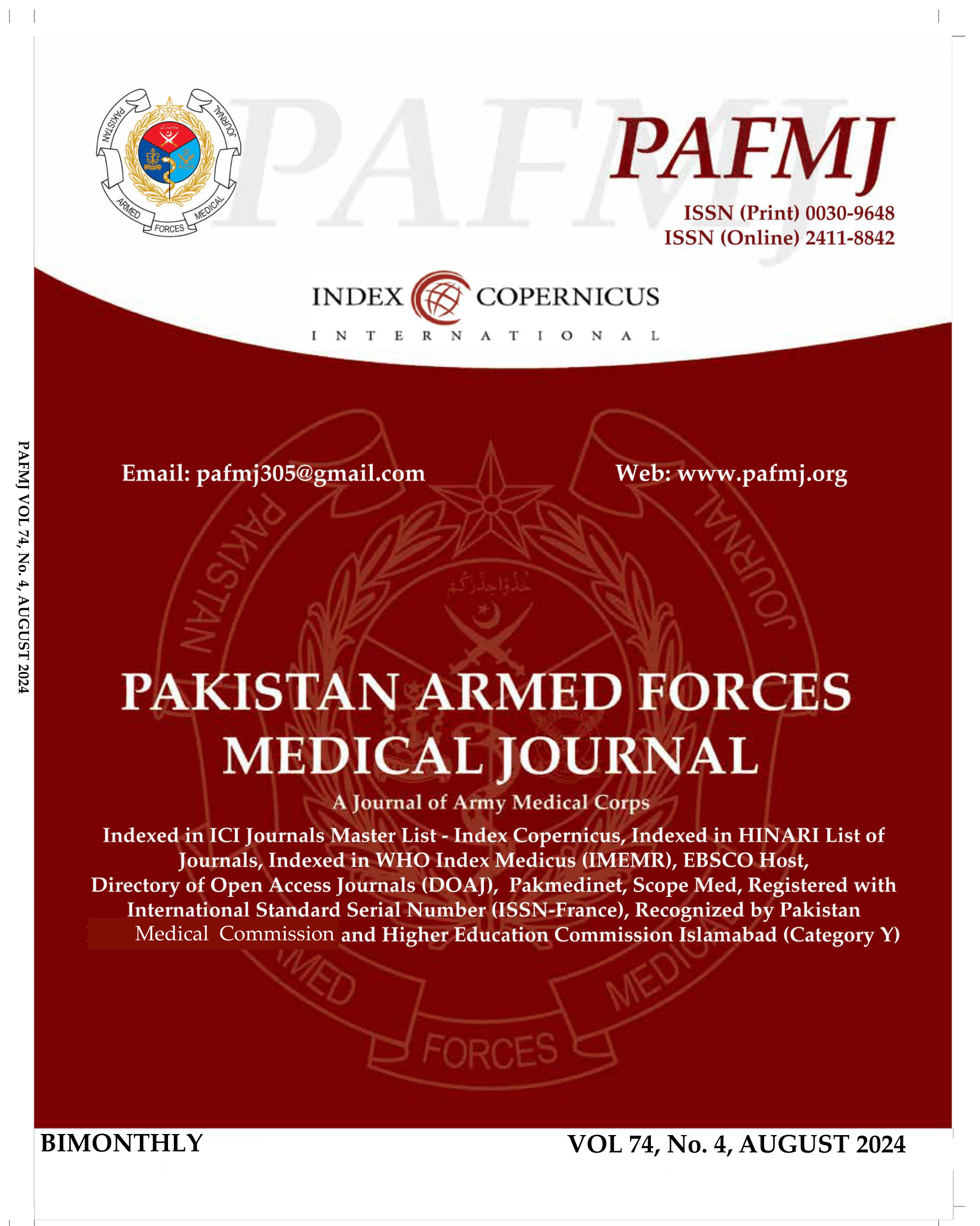Right Ventricle Diastolic Dysfunction in Tetralogy of Fallot Patients Affecting Surgical Outcome
DOI:
https://doi.org/10.51253/pafmj.v74i4.7852Keywords:
Repair, Right ventricular diastolic dysfunction, Tetralogy of fallotAbstract
Objective: To compare the surgical outcome of Tetralogy of Fallot patients with and without right ventricular diastolic dysfunction after repair.
Study Design: Quasi-experimental study.
Place and Duration of Study: Department of Cardiology, National Institute of Cardiovascular Disease, Karachi Pakistan, from May to Oct 2021.
Methodology: Patients above 5 months of age, of either gender, undergoing surgery for Tetralogy of Fallot were enrolled. Patients were divided into two groups according to the Gatzoulis’ criterion for right ventricular restriction i.e. Group-A had right ventricle with restriction, and Group-B had right ventricle without restriction. Velocities of E and A waves was recorded, and their ratio (E/A) was calculated. The outcome such as aortic cross clamp, cardiopulmonary bypass time, ventilation time, intensive care unit stay, drain time, and transannular patch was noted.
Results: Of 54 patients, restrictive physiology patients had significantly higher mean for aortic cross-clamp (p-value 0.004, 95%CI 3.54 - 17.35), ventilation time (p-value<0.001, 95% CI 20.03-31.22), intensive care unit stay (p-value 0.014, 95% CI 0.19 - 1.65), drain time (p-value<0.001, 95% CI 105.29 - 31.21), and duration of inotropes (p-value<0.001, 95% CI 29.09 - 51.79). Moreover, transannular patch was significantly higher among patients with restrictive physiology as compared to the patients without non-restrictive physiology, i.e., 23(85.2%) vs. 8(29.6%) (p-value<0.001).
Conclusion: A considerable difference was observed in the surgical outcome of Tetralogy of Fallot patients with and without right ventricular diastolic dysfunction after repair.
Downloads
References
Bano S, Akhtar S, Khan U. Pediatric congenital heart diseases: Patterns of presentation to the emergency department of a tertiary care hospital. Pak J Med Sci 2020; 36(3): 333.
https://doi.org/10.12669/pjms.36.3.1492
Murphy GS, Brull SJ. Residual neuromuscular block: lessons unlearned. Part I: definitions, incidence, and adverse physiologic effects of residual neuromuscular block. Anesth Analg 2010; 111(1): 120-128.
https://doi.org/10.1213/ANE.0b013e3181da832d
Wülfers EM, Greiner J, Giese M, Madl J, Kroll J, Stiller B, et al. Quantitative collagen assessment in right ventricular myecto-mies from patients with tetralogy of Fallot. Europ 2021; 10.
Quattrone A, Lie OH, Nestaas E, de Lange C, Try K, Lindberg HL, et al. Impact of pregnancy and risk factors for ventricular arrhythmias in women with tetralogy of Fallot. Open Heart 2021; 8(1): 8. https://doi.org/10.1136/openhrt-2020-001475
Shehata EM, El Nagar ESM, El Dsoky Shara M, Abu-Farag IM. Echocardiographic assessment of right ventricular functions in children after surgical repair of Tetralogy of Fallot. Sci J Al-Azhar Med Fac Girl 2019; 3: 283-290.
Puri GD. Role of Echocardiography for Immediate Postoperative ICU Management after Tetralogy of Fallot Repair. J Perioper Echocardiog 2018; 6(2): 33-35.
Sachdev MS, Bhagyavathy A, Varghese R, Coelho R, Kumar RS. Right ventricular diastolic function after repair of tetralogy of Fallot. Pediatr Cardiol 2006; 27(2): 250-255.
https://doi.org/10.1007/s00246-005-1101-8
Santens B, Van De Bruaene A, De Meester P, D’Alto M, Reddy S, Bernstein D, et al. Diagnosis and treatment of right ventricular dysfunction in congenital heart disease. Cardiovasc Diagn Ther 2020; 10(5): 1625. https://doi.org/10.21037/cdt-20-332
Hoelscher M, Bonassin F, Oxenius A, Seifert B, Leonardi B, Kellenberger CJ, et al. Right ventricular dilatation in patients with pulmonary regurgitation after repair of tetralogy of Fallot: How fast does it progress? Ann Pediatr Cardiol 2020; 13(4): 294.
https://doi.org/10.4103/apc.APC_7_20
Munkhammar P, Carlsson M, Arheden H, Pesonen E. Restrictive right ventricular physiology after tetralogy of Fallot repair is associated with fibrosis of the right ventricular outflow tract visualized on cardiac magnetic resonance imaging. Eur Heart J Cardiovasc Imaging 2013; 14(10): 978-985.
https://doi.org/10.1093/ehjci/jet041
Gatzoulis MA, Clark AL, Cullen S, Newman CG, Redington AN. Right ventricular diastolic function 15 to 35 years after repair of tetralogy of Fallot. Restrictive physiology predicts superior exercise performance. Circulation 1995; 91: 1775-1781.
https://doi.org/10.1161/01.cir.91.6.1775
Kido T, Ueno T, Taira M, Ozawa H, Toda K, Kuratani T, et al. Clinical predictors of right ventricular myocardial fibrosis in patients with repaired tetralogy of Fallot. Circ J 2018; 82(4): 1149-1154. https://doi.org/10.1253/circj.CJ-17-0883
Shin YR, Jung JW, Kim NK, Choi JY, Kim YJ, Shin HJ, et al. Factors associated with progression of right ventricular enlargement and dysfunction after repair of tetralogy of Fallot based on serial cardiac magnetic resonance imaging. Eur J Cardiothorac Surg 2016; 50(3): 464-469.
https://doi.org/10.1093/ejcts/ezw049
Ojha V, Pandey NN, Sharma A, Ganga KP. Spectrum of changes on cardiac magnetic resonance in repaired tetralogy of Fallot: Imaging according to surgical considerations. Clin Imaging 2021; 69: 102-114.
https://doi.org/10.1016/j.clinimag.2020.07.006
Gnanappa GK, Celermajer DS, Zhu D, Puranik R, Ayer J. Severe right ventricular dilatation after repair of Tetralogy of Fallot is associated with increased left ventricular preload and stroke volume. Eur Heart J Cardiovasc Imaging 2019; 20(9): 1020-1026.
https://doi.org/10.1093/ehjci/jez097
Klinke A, Schubert T, Müller M, Legchenko E, Zelt JG, Shimauchi T, et al. Emerging therapies for right ventricular dysfunction and failure. Cardiovasc Diagn Ther 2020; 10(5): 1735.
https://doi.org/10.21037/cdt-20-392
Navaratnam M, DiNardo JA. Peri-operative right ventricular dysfunction—the anesthesiologist’s view. Cardiovasc Diagn Ther 2020; 10(5): 1725. https://doi.org/10.21037/cdt-20-362
Hotwani P, Goswami P, Kumar P, Dasi C. Spectrum and association of congenital heart defects with other congenital malformations in Sindh, Pakistan. Rawal Med J 2021; 46(1): 159-162.
Javed S, Bajwa TH, Bajwa MS, Shah SS. Current status of paediatric cardiac surgery in Pakistan. Ann King Edward Med Univ 2021; 27(2). https://doi.org/10.21649/akemu.v27i2.4542
Downloads
Published
Issue
Section
License
Copyright (c) 2024 Shakeel Ahmed, Fazal Ur Rehman, Aliya Kemal Ahsan, Ali Raza, Abdul Sattar Shaikh

This work is licensed under a Creative Commons Attribution-NonCommercial 4.0 International License.















